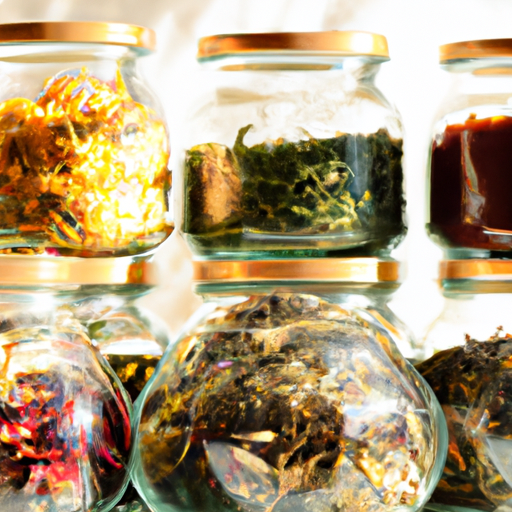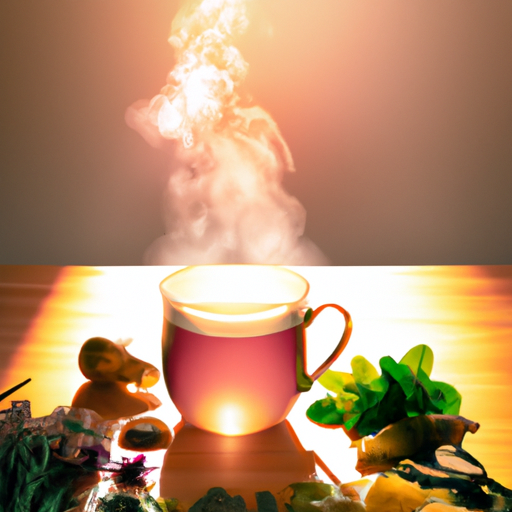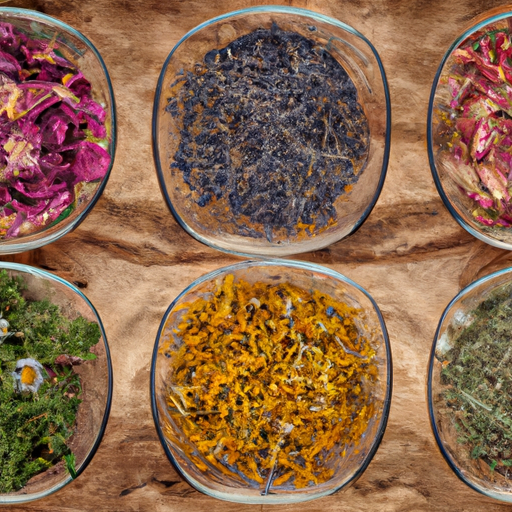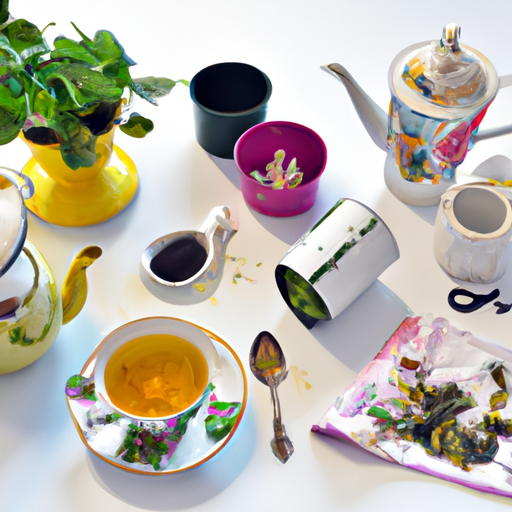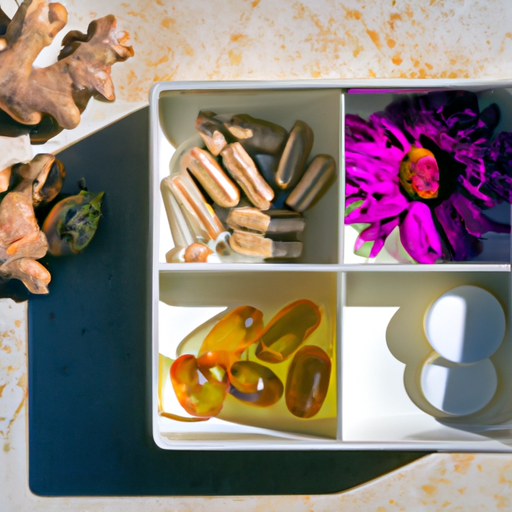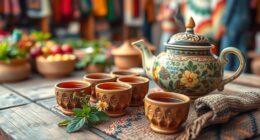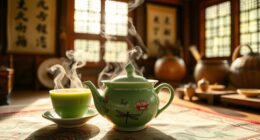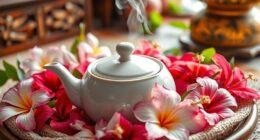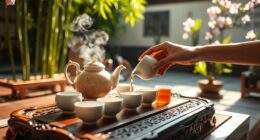Did you know that there are over 20 different types of herbal tea? That’s right, the world of herbal tea is vast and diverse, offering a wide range of flavors and health benefits. From soothing chamomile to invigorating ginger, there is a herbal tea for every taste and need. In this article, I will introduce you to some of the most popular types of herbal tea and explore their unique properties.
One of the most beloved herbal teas is chamomile tea. Known for its calming effects, chamomile tea is often enjoyed before bed to promote relaxation and better sleep.
Peppermint tea, on the other hand, is renowned for its refreshing taste and ability to soothe digestive issues.
Hibiscus tea is not only vibrant in color but also rich in antioxidants, making it a popular choice for boosting immunity.
If you are looking for a floral delight, lavender tea is the perfect choice. With its delicate aroma and calming properties, it can be a great way to unwind after a long day.
Ginger tea, with its spicy kick, is known for its digestive benefits and can provide relief from nausea and inflammation.
Lemon balm tea offers a citrusy flavor and is often used to reduce anxiety and improve mood.
Lastly, there is rooibos tea, a caffeine-free herbal tea that has a naturally sweet taste and is packed with antioxidants. It is known for its potential to support heart health and improve skin conditions.
In this article, we will explore these seven types of herbal tea in more detail, uncovering their unique flavors, health benefits, and how to prepare them.
So, grab a cup of your favorite herbal tea, sit back, and let’s dive into the wonderful world of herbal infusions.
Key Takeaways
- There are over 20 different types of herbal tea available.
- Herbal tea offers a wide range of flavors and health benefits.
- Herbal teas are rich in antioxidants and vitamin C.
- Antioxidants in herbal teas help fight free radicals and promote healthy skin.
Chamomile Tea
Chamomile tea is the ultimate relaxation potion, perfect for soothing your mind and body after a long day. Known for its calming properties, chamomile benefits include reducing anxiety, promoting sleep, and relieving digestive issues. This herbal tea is made from the flowers of the chamomile plant, which have been used for centuries in traditional medicine.
To prepare chamomile tea, steep a teaspoon of dried chamomile flowers in hot water for about 5 minutes. You can also enhance the flavor by adding a squeeze of lemon or a teaspoon of honey.
Chamomile tea is not only delicious but also offers numerous health benefits.
It’s time to move on to the next soothing herbal tea, peppermint tea, which offers its own unique set of benefits.
Peppermint Tea
Peppermint tea offers a refreshing and invigorating experience with its soothing and minty flavor. Not only is it a delicious beverage, but it also possesses numerous medicinal properties.
Peppermint tea is known to aid in digestion, relieve headaches, and soothe muscle pain. It has anti-inflammatory and antibacterial effects, making it a great option for boosting the immune system.
Brewing peppermint tea is quite simple. Start by boiling water and pouring it over the dried peppermint leaves. Let it steep for about 5-10 minutes and then strain the leaves. You can enjoy it hot or chill it for a refreshing iced tea.
Now, let’s move on to the next herbal tea variety, hibiscus tea, which has its own unique benefits and flavors.
Hibiscus Tea
Hibiscus tea is a delightful and refreshing herbal tea that offers numerous health benefits. One of its key points is its ability to lower blood pressure and cholesterol levels, making it an excellent choice for those looking to improve their heart health.
Additionally, hibiscus tea is rich in antioxidants and vitamin C, providing a powerful boost to the immune system and helping to fight off free radicals in the body.
Overall, incorporating hibiscus tea into your daily routine can be a simple and effective way to support your overall well-being.
Lowers Blood Pressure and Cholesterol
Furthermore, consuming herbal tea has been shown to effectively reduce both blood pressure and cholesterol levels. Herbal teas, such as hibiscus tea, can be a natural and effective way to lower blood pressure through lifestyle changes.
Regularly drinking hibiscus tea has been found to have a significant impact on blood pressure, with studies showing a reduction in both systolic and diastolic readings. Additionally, herbal teas like hibiscus tea can also serve as natural remedies for lowering cholesterol. Research suggests that certain compounds found in hibiscus tea can help decrease LDL cholesterol levels, commonly known as the ‘bad’ cholesterol.
By incorporating these herbal teas into your daily routine, you can take a proactive approach to improving your cardiovascular health. Plus, herbal teas are rich in antioxidants and vitamin C, which we will explore in the next section.
Rich in Antioxidants and Vitamin C
Indulge in the vibrant flavors of antioxidant-rich herbal teas to boost your immune system and invigorate your senses. Herbal teas aren’t just delicious, but they also offer numerous benefits for your skin. The antioxidants in these teas help fight free radicals, preventing premature aging and promoting a healthy complexion.
Additionally, herbal teas are a great way to soothe your body during cold and flu season. Try brewing a blend of chamomile, ginger, and honey to provide relief from congestion and a sore throat. Or, for a refreshing twist, mix peppermint, lemon balm, and a squeeze of lemon to ease symptoms and clear your sinuses.
Transitioning into the next section, let’s explore the calming properties of lavender tea.
Lavender Tea
Soothing and serene, lavender tea is a delightful herbal infusion. Not only does it offer a calming aroma, but it also boasts numerous health benefits.
Lavender tea is known for its ability to promote relaxation, reduce anxiety, and improve sleep quality. It’s also rich in antioxidants, which help fight free radicals in the body and boost the immune system.
To make lavender tea, simply steep dried lavender flowers in hot water for about 5 minutes. You can also add a touch of honey or lemon for added flavor.
As we transition to the next section, let’s explore the invigorating properties of ginger tea and its unique benefits for our well-being.
Ginger Tea
To enhance your well-being, you can savor the invigorating properties of ginger tea, a warm and comforting beverage that offers unique health benefits. Ginger tea is known for its anti-inflammatory and antioxidant properties, making it a great choice for boosting the immune system and aiding digestion. This aromatic tea can also help relieve nausea and reduce muscle pain.
To make a delicious cup of ginger tea, start by peeling and slicing fresh ginger root. Place the ginger slices in a pot with water and bring it to a boil. Let it simmer for about 10 minutes to allow the flavors to infuse. Strain the tea and add a touch of honey or lemon for extra flavor.
Here is a table highlighting some of the health benefits of ginger tea:
| Health Benefits of Ginger Tea |
|---|
| Boosts immune system |
| Aids digestion |
| Relieves nausea |
Transitioning to the subsequent section about lemon balm tea, this herbal beverage also offers a range of health benefits.
Lemon Balm Tea
Moving on from the invigorating taste of Ginger Tea, let’s explore the soothing qualities of Lemon Balm Tea. Made from the leaves of the lemon balm plant, this herbal tea offers a delightful citrusy flavor with a hint of mint.
Known for its calming properties, Lemon Balm Tea has been used for centuries to promote relaxation and reduce anxiety. It’s also believed to aid in digestion and relieve headaches.
Lemon Balm Tea can be enjoyed on its own or combined with other herbs and flavors to create unique recipes. Some popular variations include adding honey for a touch of sweetness, steeping it with chamomile for a soothing blend, or infusing it with lavender for a floral twist.
Additionally, Lemon Balm Tea can be used as a base for iced teas or mixed into cocktails for a refreshing summer drink.
Now, let’s delve into the world of Rooibos Tea and discover its fascinating characteristics.
Rooibos Tea
Rooibos tea, also known as red tea, is a delicious and healthy beverage that supports heart health and reduces allergies. It’s rich in antioxidants and minerals, making it a great choice for those looking to boost their overall well-being.
The natural compounds found in rooibos tea have anti-inflammatory properties. They may help lower blood pressure, reduce cholesterol levels, and improve heart health. Additionally, its high levels of antioxidants can help protect the body against oxidative stress and free radicals, which can lead to chronic diseases.
Supports Heart Health and Reduces Allergies
Additionally, drinking herbal tea can improve heart health and alleviate allergy symptoms. Herbal tea benefits the immune system by reducing inflammation and strengthening the cardiovascular system. Certain herbal teas, like Rooibos tea, contain antioxidants and flavonoids that’ve been shown to support heart health. By reducing oxidative stress and lowering blood pressure, herbal teas can help prevent heart disease and improve overall cardiovascular function.
Furthermore, herbal teas have natural antihistamine properties that can help reduce allergy symptoms such as sneezing, itching, and congestion. They work by inhibiting the release of histamine, a compound that triggers allergic reactions.
Moreover, herbal teas’re rich in antioxidants and minerals, which’re essential for maintaining optimal health and preventing diseases.
Rich in Antioxidants and Minerals
Drinking herbal tea is like giving your body a refreshing antioxidant and mineral boost. Herbal teas are packed with beneficial antioxidants and minerals that contribute to overall health and well-being. Here are four reasons why herbal tea should be a part of your daily routine:
-
Supports Digestion: Herbal teas such as peppermint, ginger, and chamomile have been known to soothe digestive issues like bloating, indigestion, and stomach cramps. These teas can help promote healthy digestion and alleviate discomfort.
-
Reduces Stress: Herbal teas like lavender, lemon balm, and passionflower have calming properties that can help reduce stress and anxiety. They can promote relaxation and improve sleep quality, allowing you to unwind and recharge.
-
Boosts Immunity: Many herbal teas, such as echinacea, elderberry, and green tea, contain immune-boosting properties. These teas can help strengthen your immune system, making you less susceptible to illnesses.
-
Hydration with Flavor: Herbal teas provide a delicious and hydrating alternative to sugary drinks. They’re a flavorful way to increase your daily fluid intake while reaping the benefits of their antioxidant and mineral content.
Incorporating herbal tea into your daily routine can have numerous benefits for digestion and stress relief. Start enjoying a cup of herbal tea today and experience the positive impact it can have on your well-being.
Frequently Asked Questions
Can herbal teas be mixed together to create unique flavors and benefits?
Mixing different herbal teas is like playing a symphony of flavors. The art of tea blending allows you to create unique combinations, unlocking new tastes and benefits. It’s a delightful journey for your taste buds and a creative exploration in the world of herbal infusions.
Are there any potential side effects or interactions to be aware of when consuming herbal teas?
Potential side effects and interactions of consuming herbal teas can vary depending on the specific herbs used. It is important to consult with a healthcare professional to ensure safety and to discuss any potential risks.
How should herbal teas be stored to maintain their freshness and potency?
To maintain the freshness and potency of herbal teas, it is important to store them properly. Best practices include keeping them in airtight containers, away from light and moisture, to preserve flavors and maintain their beneficial properties.
Can herbal teas be consumed by pregnant women or individuals with certain health conditions?
Yes, herbal teas can be consumed by pregnant women and individuals with certain health conditions. However, it is important to consult with a healthcare professional to ensure safety and to determine which herbs are suitable for your specific situation.
Are there any recommended serving sizes or guidelines for preparing herbal teas for optimal taste and benefits?
There are recommended serving sizes for herbal teas to ensure optimal taste and benefits. The brewing time and temperature can vary depending on the specific herbal tea blend. It’s important to follow instructions or experiment to find the perfect balance.
Conclusion
So there you have it, a brief overview of some of the most popular types of herbal tea. From calming chamomile to invigorating ginger, there’s a flavor for every palate and a benefit for every need.
But did you know that herbal teas have been used for centuries for their medicinal properties? In fact, according to a study published in the Journal of Ethnopharmacology, herbal teas’ve been found to have antioxidant, anti-inflammatory, and antimicrobial effects.
So not only do they taste great, but they also’ve potential health benefits. Cheers to that!

